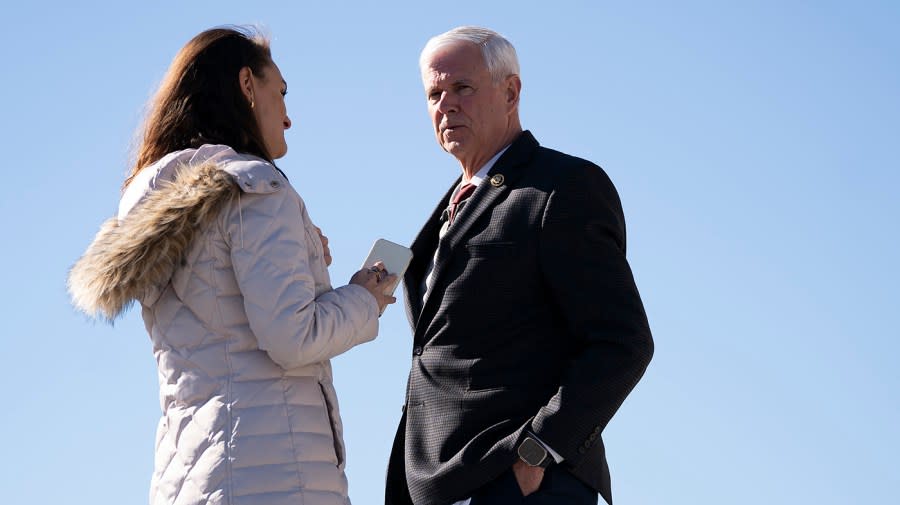Lawmakers face sticking points as looming shutdown deadline nears

- Oops!Something went wrong.Please try again later.
- Oops!Something went wrong.Please try again later.
- Oops!Something went wrong.Please try again later.
- Oops!Something went wrong.Please try again later.
Congressional negotiators are facing a series of hurdles in crafting legislation to fund the government as lawmakers navigate partisan divides with added budget constraints.
Spending cardinals in both chambers say they’ve made major strides in spending talks as they hash out how to divide the funds, but they also say they have not yet tackled a list of partisan and controversial policy riders.
And some sticking points are already beginning to emerge.
Rep. Steve Womack (R-Ark.), one of the lower chamber’s 12 spending cardinals, identified the FBI and “election security assistance,” as well as the IRS, as early points of contention in the annual appropriations talks.
“We’re just not together on the allocations for those, the different marks,” Womack told The Hill last week. “Then, on top of that, we haven’t even gone down the road of the policy riders, and there’s a lot of open items right now that we got to resolve.”
Appropriators say talks ramped up shortly after top negotiators struck a deal allowing both chambers to begin crafting compromise spending proposals that can make it through a divided Congress.
But both chambers entered negotiations with drastically different bills, after House Republicans pursued significantly lower spending levels than those previously agreed to in a budget caps deal, while Senate Democrats went higher in their set of bills.
“The House and Senate took a very different approach at the very beginning, and now we have to come together on things,” Sen. Tammy Baldwin (D-Wis.), cardinal for the subcommittee that crafts the annual funding bill for agencies including the departments of Labor and Health and Human Services, said last week.
The bill, which also covers funding for the Education Department, is often seen as one of the toughest of the 12 annual funding bills to negotiate and has previously been a battleground for fights over policies in thorny areas such as abortion.
Baldwin said after a recent meeting with the subcommittee’s top negotiators in both chambers that there has been “some progress” made in negotiations. But senior appropriators also signal there is still much work to be done ahead of a pair of shutdown deadlines in March.
Sen. Shelley Moore Capito (W.Va.), who serves as top Republican on the Senate subcommittee alongside Baldwin, said after the meeting last week that the discussion went “really well,” although she also acknowledged “pending” issues in talks.
“Those are obviously riders and other things,” Capito said. “Look, we’re going back to the drawing board, assuming we can go.”
“I wouldn’t say we’re at an impasse on some of the bigger issues, but a lot of the smaller issues and everything else we were able to understand,” she said.
The Labor and Health and Human Services funding bill is among the eight annual appropriations measures lawmakers must pass by a March 8 deadline under a recent stopgap bill passed out of Congress. Lawmakers also face a more immediate March 1 deadline to pass the other four funding bills.
The March deadlines come after three stopgap funding bills to keep the government open while lawmakers continue to hash out spending. Missing either one would risk Congress’s first partial government shutdown in years.
Negotiators in both chambers have maintained that they’re confident in getting their work done in time.
However, there is bipartisan agreement that the partisan riders being sought by House Republicans will make their jobs more difficult.
Rep. Chuck Fleischmann (R-Tenn.), one of the spending cardinals whose subcommittee’s funding bill is set to expire under the first deadline, said Wednesday that he’s “optimistic” about reaching the early March deadline, adding that negotiations on his bill are “moving in the right direction.”
But Fleischmann, whose subcommittee covers funding for the Department of Energy (DOE), acknowledged that “there are going to be some issues ultimately that can’t be resolved at the committee level,” particularly the riders his party is pushing for in his subpanel’s forthcoming bill.
Among the riders proposed as part of the DOE funding bill includes measures targeting the Biden administration’s waterways rules, orders on diversity and inclusion and other partisan policies.
“That’s going to be probably a consistent theme across all 12 bills, if you will, because we have very similar riders, some of which are very important to us and some of which are very abhorrent to the other side,” Fleischmann said.
“So, those are issues, ultimately, I think that our leadership will address,” he added.
At the same time, some negotiators say they see the last stopgap, also known as a continuing resolution (CR), passed in January as potentially Congress’s last chance to buy more time for talks.
“We’ve strung this out for too damn long already. I think another CR — at some point in time you have to ask yourself, ‘What good is it?’ So, I think that’s the last shot,” Sen. Jon Tester (D-Mont.), the cardinal for Pentagon funding in the upper chamber, said last week.
But other negotiators are warning the calendar is tight.
Asked if he was confident of Congress meeting the March funding deadlines, Womack said last week that he thinks “there’s incentive out there for us to get our work done.”
“The problem is that there’s a lot of work to be done still,” he said. “But there’s incentives, you know, like earmarks and those kinds of things, defense spending.”
“So, yeah, we’ll try to muddle through.”
For the latest news, weather, sports, and streaming video, head to The Hill.

